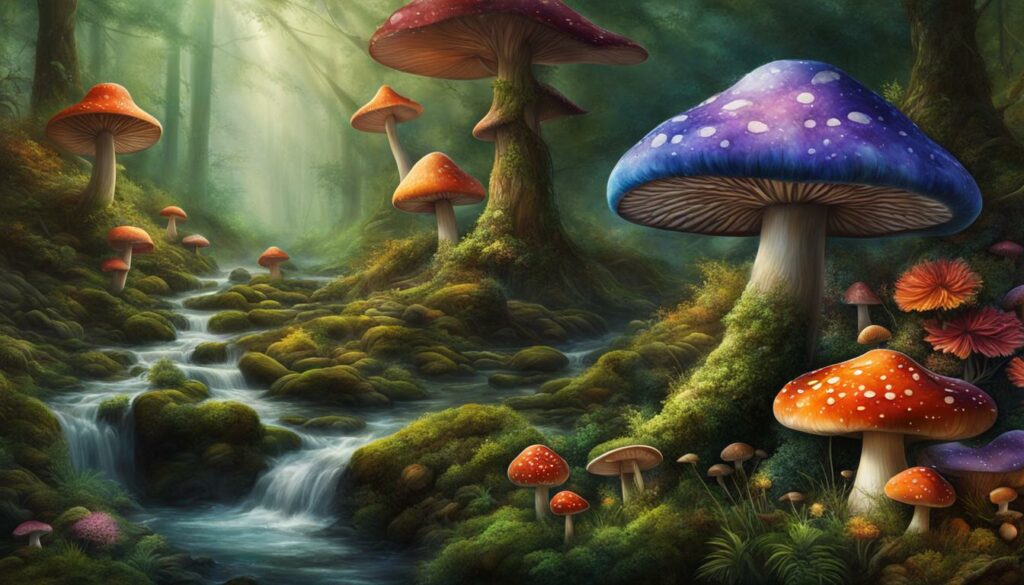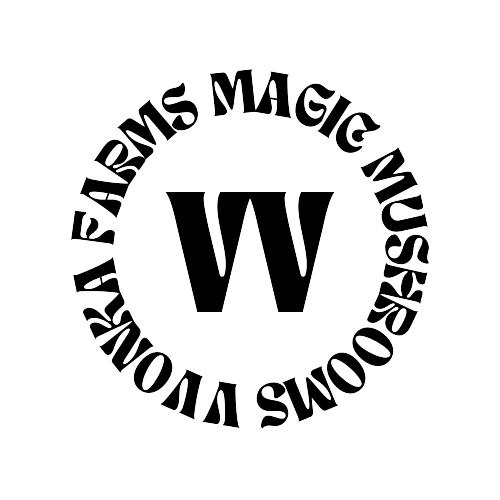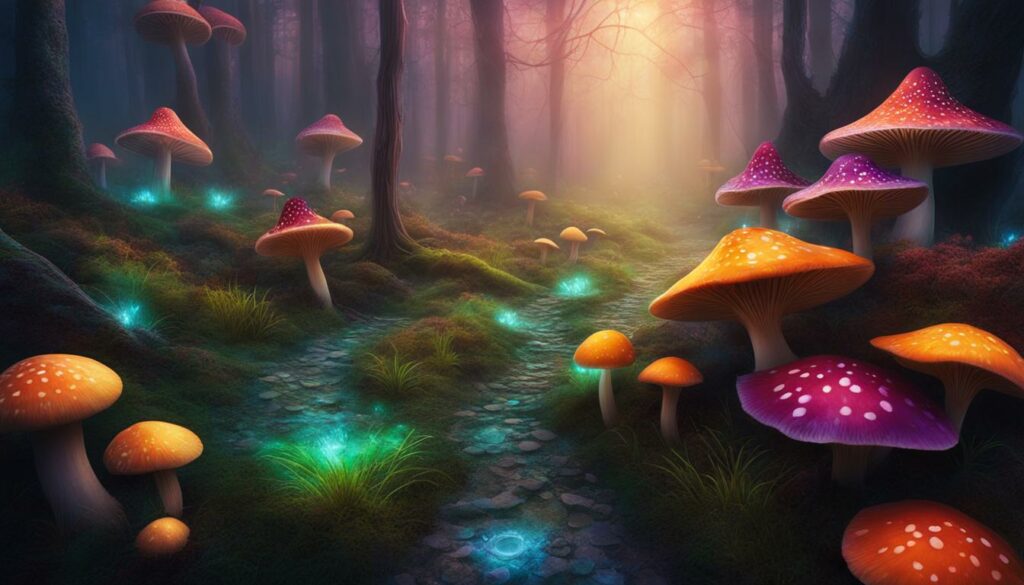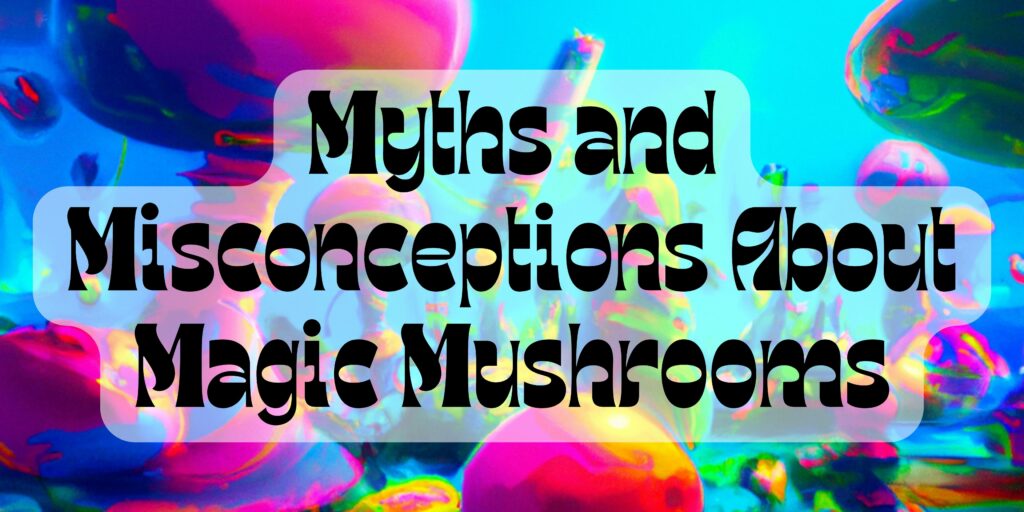Welcome to our comprehensive guide on shrooms drugs! In this article, we will explore the effects, risks, therapeutic potential, and accessibility of magic mushrooms, also known as shrooms. It’s essential to have a clear understanding of these substances to prioritize your health and safety.
Magic mushrooms contain hallucinogens like psilocybin and psilocin, which can induce a variety of experiences, from hallucinations to anxiety. It’s important to note that the production, sale, and possession of magic mushrooms are illegal in Canada.
Despite legal restrictions, psilocybin has shown promise in clinical trials for treating mental health conditions, but there are no approved therapeutic products containing psilocybin currently available. Let’s delve deeper into the effects, risks, and potential therapeutic uses of magic mushrooms in the sections below.
Key Takeaways:
- Shrooms drugs, or magic mushrooms, contain hallucinogens like psilocybin and psilocin.
- The use of magic mushrooms can cause hallucinations, anxiety, nausea, and muscle twitches.
- High doses of magic mushrooms can lead to “bad trips” and paranoia.
- Potential therapeutic uses of psilocybin are being explored, particularly in treating depression and anxiety disorders.
- Access to psilocybin for therapeutic use in Canada is limited but possible through clinical trials and the Special Access Program.
The Effects of Magic Mushrooms
When it comes to magic mushrooms, commonly referred to as shrooms, the effects can be quite profound. The active compounds in these fungi, psilocybin and psilocin, have a direct impact on the brain, resulting in a range of experiences and sensations.
Commonly reported effects include distorted perception, hallucinations, changes in mood, anxiety, confusion, and alterations in sensory perception. The intensity of these effects can vary from person to person, and depend on factors such as the dosage and the specific type of mushroom consumed.
During a shrooms trip, individuals may experience a heightened sense of connectivity to their surroundings and a deep introspective state. These experiences can be both intensely pleasurable and challenging, as users may confront powerful emotions or face difficult thoughts. It is essential for users to approach these experiences with caution and in a safe environment, preferably with the guidance of an experienced sitter.
Using a Shrooms Trip Journal
A helpful tool for individuals exploring the effects of magic mushrooms is a shrooms trip journal. This journal allows users to document their experiences, emotions, and thoughts during their trips. It can provide valuable insights and serve as a personal record of one’s journey.
Keeping a shrooms trip journal allows users to reflect on their experiences and gain a deeper understanding of themselves. It can be a transformative and enlightening practice.
Additionally, a shrooms trip journal can be shared with healthcare providers or therapists to facilitate discussions on the potential therapeutic benefits or concerns associated with magic mushroom usage. It is important to note that the use of magic mushrooms for recreational purposes is illegal in many jurisdictions, and caution should be exercised at all times.
Table: Common Effects of Magic Mushrooms
| Effect | Description |
|---|---|
| Hallucinations | Visual and auditory distortions, seeing and hearing things that are not present. |
| Mood Changes | Fluctuations in emotions, ranging from euphoria to anxiety. |
| Perceptual Alterations | Changes in sensory perception, such as heightened colors or intensified sounds. |
| Anxiety | Feelings of unease, restlessness, or a sense of impending doom. |
| Confusion | Difficulty in processing information or organizing thoughts. |
It is crucial to approach the use of magic mushrooms responsibly and with respect for their powerful effects. Understanding the potential risks and being mindful of set and setting can help ensure a safe and meaningful experience.
Risks and Long-term Effects of Magic Mushrooms
Magic mushrooms may offer a unique and mind-altering experience, but they are not without risks. Understanding the potential dangers associated with the use of magic mushrooms is crucial for ensuring your safety and well-being.
One important consideration is the dosage of magic mushrooms. Taking a high dose can increase the likelihood of experiencing negative effects such as paranoia, loss of boundaries, and a distorted sense of self. It is important to start with a low dose and gradually increase it if desired, while always keeping in mind the potential risks.
Regular and repetitive use of magic mushrooms can also lead to tolerance, where higher doses are needed to achieve the same effects. The long-term effects of repetitive use of magic mushrooms are still not well-studied, and it is unclear whether prolonged use can lead to any lasting physical or psychological harm. Further research is needed to gain a better understanding of the potential risks and long-term effects.
Table: Risks and Long-term Effects of Magic Mushrooms
| Risks | Long-term Effects |
|---|---|
| High doses can cause paranoia and loss of boundaries | Long-term effects are not well-studied |
| Distorted sense of self | |
| Tolerance to the drug’s effects |
It is also worth noting that the use of magic mushrooms can sometimes result in “bad trips” or “flashbacks,” which can be distressing and may have a lasting impact on a person’s mental well-being. While these experiences are relatively rare, they can occur, particularly in individuals who are predisposed to certain mental health conditions.
Overall, it is important to approach the use of magic mushrooms with caution and always prioritize your safety. If you are considering using magic mushrooms for therapeutic or recreational purposes, it is advisable to seek guidance from a healthcare professional who is knowledgeable about their effects and risks.

Potential Therapeutic Uses of Psilocybin
Psilocybin, the active ingredient in magic mushrooms, has been gaining attention for its potential therapeutic uses. Studies have shown promising results in using psilocybin to treat various mental health conditions, including depression, anxiety, obsessive-compulsive disorder, and substance use disorders. Clinical trials exploring the efficacy of psilocybin are ongoing, and the results are encouraging.
One of the most significant findings is the potential of psilocybin to treat treatment-resistant depression. Traditional antidepressant medications may not work for everyone, and those who do not respond to conventional treatments often face prolonged suffering. However, small clinical trials have shown that psilocybin therapy can lead to significant improvements in mood and quality of life for these individuals.
Psilocybin therapy typically involves a guided session in a supportive and controlled environment, where individuals consume a carefully measured dose of psilocybin. This experience can help individuals gain new perspectives, explore their emotions, and gain insights that may lead to lasting positive changes in their mental health.
“Psilocybin therapy has the potential to revolutionize the field of mental health treatment. It offers a unique approach to healing, focusing on the underlying causes of mental health disorders rather than just symptom management.” – Dr. Jane Thompson, Psychiatrist
Current Research and Future Possibilities
While the therapeutic use of psilocybin is still in the early stages of exploration, the results thus far have been promising. The potential benefits of psilocybin extend beyond the treatment of depression and anxiety. Researchers are also investigating its effectiveness in other areas, such as end-of-life anxiety in terminally ill patients, post-traumatic stress disorder, and addiction.
As more research is conducted, and regulations around psychedelic substances evolve, the future of psilocybin therapy looks promising. However, it is essential to approach its use with caution and under the guidance of trained healthcare professionals. Close monitoring and integration of the experiences are crucial for ensuring its safety and effectiveness.
| Condition | Potential Benefits |
|---|---|
| Depression | Potential treatment for treatment-resistant depression |
| Anxiety | Reduction in anxiety symptoms and improved quality of life |
| Obsessive-Compulsive Disorder | Potential reduction in obsessive thoughts and compulsive behaviors |
| Substance Use Disorders | Possible assistance in overcoming addiction and promoting long-term recovery |
| End-of-Life Anxiety | Alleviation of anxiety and improved acceptance of mortality |
As research into psilocybin continues to uncover its potential therapeutic uses, it is crucial to approach these findings with an open mind and a commitment to further exploration. While there are still regulatory hurdles and societal stigma surrounding psychedelic substances, the growing body of evidence suggests that psilocybin may hold immense promise in revolutionizing mental health treatment.
Access to Psilocybin for Therapeutic Use
In Canada, individuals seeking access to psilocybin for therapeutic use have limited legal pathways available to them. These pathways include participation in clinical trials, utilizing the Special Access Program, or obtaining individual exemptions from the Controlled Drugs and Substances Act. These options aim to provide individuals with access to psilocybin in a controlled and monitored manner, under the supervision of healthcare professionals.
The Special Access Program allows patients with serious or life-threatening conditions, including mental health disorders, to access drugs that are not yet approved for sale in Canada. This program enables healthcare practitioners to request access to psilocybin on behalf of their patients, considering the patient’s specific needs and circumstances. The approval process involves thorough assessment and evaluation.
Individual exemptions from the Controlled Drugs and Substances Act can be granted by the Minister of Health or the Minister’s delegate, providing individuals with authorization to possess and use psilocybin for medical purposes. These exemptions are typically granted in cases where other treatment options have been exhausted or are deemed ineffective for the individual’s condition. It is important to note that these exemptions are granted on a case-by-case basis.
Microdosing Shrooms: A Potential Approach
Microdosing, the practice of taking sub-perceptual doses of psychedelics such as psilocybin, has gained attention as a potential treatment approach for mental health conditions. Microdosing involves taking very small doses, often a fraction of a typical recreational dose, with the aim of experiencing subtle effects without hallucinations or significant alterations in perception.
Advocates of microdosing suggest that it may improve mood, increase focus and creativity, and alleviate symptoms of depression and anxiety. However, it is important to note that the evidence supporting the benefits of microdosing is anecdotal and limited. Further research is needed to understand the potential therapeutic effects, optimal dosing regimens, and long-term safety of microdosing with psilocybin.
While access to psilocybin for therapeutic use in Canada is currently limited, ongoing research and clinical trials are exploring the potential benefits and risks of psilocybin-assisted therapy. These efforts aim to expand our understanding of how psilocybin can be used safely and effectively, providing individuals with new treatment options for mental health disorders.
Magic Mushrooms: Exploring the Potential of Psychedelic Drugs
Psilocybin research has experienced a surge of interest and funding in recent years, indicating a growing recognition of the therapeutic potential of magic mushrooms and psychedelic drugs. Ongoing clinical trials seek to explore the efficacy of psilocybin in treating various psychiatric disorders, providing valuable insights into its benefits and safety profiles. However, the field still faces regulatory hurdles and societal stigma that need to be addressed to fully unlock the potential of these substances.
One of the key challenges in psilocybin research is navigating the complex regulatory landscape surrounding psychedelic drugs. The legal status of magic mushrooms and psilocybin varies across different jurisdictions, which can pose obstacles to conducting studies and accessing these substances for research purposes. Additionally, the historical association of psychedelics with counterculture movements and recreational use has contributed to a lingering stigma, hindering wider acceptance and understanding of the therapeutic potential they may hold.
Despite these challenges, ongoing research efforts continue to shed light on how psilocybin works in the brain and its potential mechanisms of action. By interacting with serotonin receptors in the brain, psilocybin influences brain activity and connectivity, leading to alterations in perception and cognition. This unique pharmacological profile has sparked interest in its potential as a novel treatment for conditions such as depression and anxiety.
A better understanding of the therapeutic potential of magic mushrooms and psychedelic drugs could have significant implications for mental health treatment. As the field progresses, it is crucial to prioritize patient safety and explore evidence-based approaches to incorporate these substances into mainstream healthcare. By bridging the gap between research findings and clinical applications, we can unlock the transformative power of psilocybin and usher in a new era of psychedelic-assisted therapies.
How Psilocybin Works in the Brain
Psilocybin, the active compound found in magic mushrooms, interacts with serotonin receptors in the brain, leading to profound changes in brain activity and neuronal connectivity. This mechanism of action is believed to underlie the psychedelic effects of psilocybin and its potential therapeutic benefits.
Research suggests that psilocybin primarily binds to serotonin 2A receptors (5-HT2A) in the prefrontal cortex, which plays a crucial role in mood regulation, cognition, and perception. By stimulating these receptors, psilocybin alters the balance of neurotransmitters and disrupts normal brain activity, resulting in the characteristic changes in consciousness experienced during a psychedelic trip.
Moreover, psilocybin is thought to modulate the default mode network (DMN) in the brain, which is a network of brain regions involved in self-reflection, mind-wandering, and the sense of self. Psilocybin-induced alterations in the DMN may lead to a temporary dissolution of ego boundaries, increased emotional openness, and a sense of interconnectedness with others and the environment.
These profound changes in brain function have been theorized to play a role in the potential therapeutic effects of psilocybin. Studies have shown that psilocybin-assisted therapy can effectively reduce symptoms of depression, anxiety, and addiction by promoting new insights, increasing emotional connectedness, and facilitating personal growth.

The Mechanism of Action of Psilocybin in the Brain:
Psilocybin interacts primarily with serotonin 2A receptors in the prefrontal cortex.
Stimulation of these receptors leads to alterations in neurotransmitter balance and disruption of normal brain activity.
Psiocybin also modulates the default mode network, leading to changes in self-reflection and a sense of interconnectedness.
These changes in brain function may underlie the therapeutic effects of psilocybin in treating depression, anxiety, and addiction.
Conclusion
As the interest in the potential therapeutic uses of psilocybin continues to grow, there are still many unanswered questions and challenges that need to be addressed. Ongoing research and clinical trials are crucial in further understanding the effects and potential benefits of psilocybin, while ensuring the safety of patients.
The promising results from small clinical trials exploring the efficacy of psilocybin in treating various psychiatric disorders have sparked optimism. However, regulatory hurdles and stigma surrounding the use of magic mushrooms still need to be overcome.
It is important to note that while psilocybin may hold potential therapeutic value, its use should always be approached with caution and under professional guidance. If you are seeking support for mental health disorders, discussing potential treatment options with your healthcare provider is essential.
FAQ
What are magic mushrooms?
Magic mushrooms are mushrooms that contain hallucinogenic compounds, typically psilocybin and psilocin.
What are the effects of magic mushrooms?
When consumed, magic mushrooms can cause distorted perception, hallucinations, changes in mood, anxiety, confusion, and increased heart rate and blood pressure.
Are magic mushrooms legal in Canada?
No, the production, sale, and possession of magic mushrooms are illegal in Canada.
Are there any approved therapeutic products containing psilocybin?
No, there are currently no approved therapeutic products containing psilocybin.
What are the potential therapeutic uses of psilocybin?
Psilocybin is being studied for potential therapeutic uses in treating depression, anxiety, obsessive-compulsive disorder, and substance use disorders.
How can individuals access psilocybin for therapeutic use in Canada?
In Canada, there are limited legal pathways for accessing psilocybin for therapeutic use, including through clinical trials, the Special Access Program, and individual exemptions from the Controlled Drugs and Substances Act.
What research and progress has been made in the field of psilocybin?
Psilocybin research has gained increased attention and funding in recent years, with ongoing clinical trials exploring its efficacy in treating various psychiatric disorders.
How does psilocybin work in the brain?
Psilocybin interacts with serotonin receptors in the brain, leading to changes in brain activity and neuronal connectivity. It is believed to alter brain systems synchronization and disrupt self-critical thoughts, potentially making it an effective treatment for depression.




